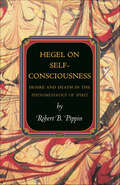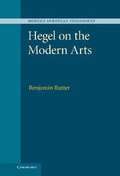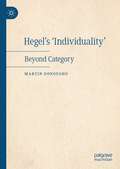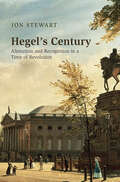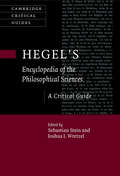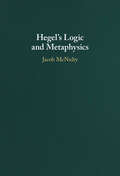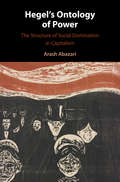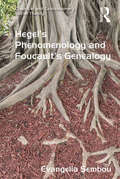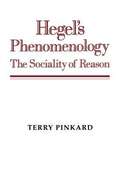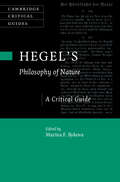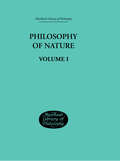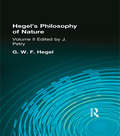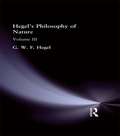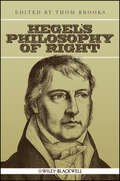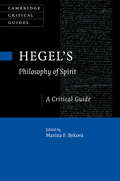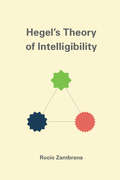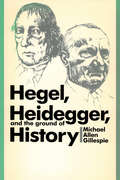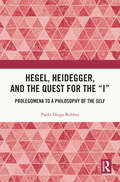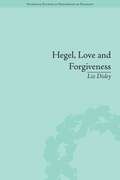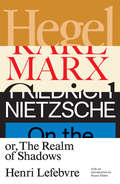- Table View
- List View
Hegel on Self-Consciousness: Desire and Death in the Phenomenology of Spirit (Princeton Monographs in Philosophy #35)
by Robert B. PippinIn the most influential chapter of his most important philosophical work, the Phenomenology of Spirit, Hegel makes the central and disarming assertions that "self-consciousness is desire itself" and that it attains its "satisfaction" only in another self-consciousness. Hegel on Self-Consciousness presents a groundbreaking new interpretation of these revolutionary claims, tracing their roots to Kant's philosophy and demonstrating their continued relevance for contemporary thought. As Robert Pippin shows, Hegel argues that we must understand Kant's account of the self-conscious nature of consciousness as a claim in practical philosophy, and that therefore we need radically different views of human sentience, the conditions of our knowledge of the world, and the social nature of subjectivity and normativity. Pippin explains why this chapter of Hegel's Phenomenology should be seen as the basis of much later continental philosophy and the Marxist, neo-Marxist, and critical-theory traditions. He also contrasts his own interpretation of Hegel's assertions with influential interpretations of the chapter put forward by philosophers John McDowell and Robert Brandom.
Hegel on the Modern Arts
by Benjamin RutterDebates over the 'end of art' have tended to obscure Hegel's work on the arts themselves. Benjamin Rutter opens this study with a defence of art's indispensability to Hegel's conception of modernity; he then seeks to reorient discussion toward the distinctive values of painting, poetry, and the novel. Working carefully through Hegel's four lecture series on aesthetics, he identifies the expressive possibilities particular to each medium. Thus, Dutch genre scenes animate the everyday with an appearance of vitality; metaphor frees language from prose; and Goethe's lyrics revive the banal routines of love with imagination and wit. Rutter's important study reconstructs Hegel's view not only of modern art but of modern life and will appeal to philosophers, literary theorists, and art historians alike.
Hegel's 'Individuality': Beyond Category
by Martin DonoughoThis book explores an overlooked area in Hegel studies: his use of ‘individuality’ (Individualität). Hegel joined a lively conversation, from Leibniz to Romanticism and beyond, about this novel concept/phenomenon. Successive chapters track Hegel’s engagement, in such texts as the Phenomenology, Encyclopedia, and Aesthetics. Hegel’s system tends to follow a syllogistic logic (universal, particular, singular), but ‘individuality’ departs from the norm. The category enacts a certain pragmatics (as against semantics or syntactics) regarding tacit assumptions at work or implicit terms of address, which requires active participation by a thinking subject charged with discerning individuality (which bars resort to explicit rules). The category reflexively implicates the user even in presuming an objective context.‘Individuality’ should not be confused with ‘individualism,’ wholly distinct in origin. Moreover, Hegel’s Aesthetics embraces a paradoxical anachronism. Like ‘art’ itself, ‘individuality’ emerged as an essentially modern category, though one transferred to the past and to distant cultures.
Hegel's Century: Alienation and Recognition in a Time of Revolution
by Jon StewartThe remarkable lectures that Hegel gave in Berlin in the 1820s generated an exciting intellectual atmosphere which lasted for decades. From the 1830s, many students flocked to Berlin to study with people who had studied with Hegel, and both his original students, such as Feuerbach and Bauer, and later arrivals including Kierkegaard, Engels, Bakunin, and Marx, evolved into leading nineteenth-century thinkers. Jon Stewart's panoramic study of Hegel's deep influence upon the nineteenth century in turn reveals what that century contributed to the wider history of philosophy. It shows how Hegel's notions of 'alienation' and 'recognition' became the central motifs for the era's thinking; how these concepts spilled over into other fields – like religion, politics, literature, and drama; and how they created a cultural phenomenon so rich and pervasive that it can truly be called 'Hegel's century.' This book is required reading for historians of ideas as well as of philosophy.
Hegel's Encyclopedia of the Philosophical Sciences: A Critical Guide (Cambridge Critical Guides)
by Sebastian Stein Joshua I. WretzelHegel regarded his Enyclopedia of the Philosophical Sciences as the work which most fully presented the scope of his philosophical system and its method. It is somewhat surprising, therefore, that scholars regularly accord it only a secondary status. This Critical Guide seeks to change that, with sixteen newly-written essays from an international group of leading Hegel scholars that shed much-needed light on both the whole and the parts of the Encyclopedia system. Topics include the structure and aim of the Encyclopedia system as a whole, the differences between the greater and lesser Logics, the role of nature in Hegel's thinking, and the shapes of absolute spirit as art, religion, and philosophy. This book will be invaluable to students and scholars with an interest in Hegel and the history of philosophy.
Hegel's Introduction to the System
by Georg Wilhelm Friedrich Hegel Robert E. WoodAs an introduction to his own notoriously complex and challenging philosophy, Hegel recommended the sections on phenomenology and psychology from The Philosophy of Spirit, the third part of his Encyclopaedia of the Philosophic Sciences. These offered the best introduction to his philosophic system, whose main parts are Logic, Nature, and Sprit.Hegel's Introduction to the System finally makes it possible for the modern reader to approach the philosopher's work as he himself suggested. The book includes a fresh translation of "Phenomenology" and "Psychology," an extensive section-by-section commentary, and a sketch of the system to which this work is an introduction. The book provides a lucid and elegant analysis that will be of use to both new and seasoned readers of Hegel.
Hegel's Logic and Metaphysics
by Jacob McNultyKant said that logic had not had to take a single step forward since Aristotle, but German Idealists in the following generation made concerted efforts to re-think the logical foundations of philosophy. In this book, Jacob McNulty offers a new interpretation of Hegel's Logic, the key work of his philosophical system. McNulty shows that Hegel is responding to a perennial problem in the history and philosophy of logic: the logocentric predicament. In Hegel, we find an answer to a question so basic that it cannot be posed without risking incoherence: what is the justification for logic? How can one justify logic without already relying upon it? The answer takes the form of re-thinking the role of metaphysics in philosophy, so that logic assumes a new position as derivative rather than primary. This important book will appeal to a wide range of readers in Hegel studies and beyond.
Hegel's Ontology of Power: The Structure of Social Domination in Capitalism
by Arash AbazariRecent attempts to revitalize Hegel's social and political philosophy have tended to be doubly constrained: firstly, by their focus on Hegel's Philosophy of Right; and secondly, by their broadly liberal interpretive framework. Challenging that trend, Arash Abazari shows that the locus of Hegel's genuine critical social theory is to be sought in his ontology – specifically in the 'logic of essence' of the Science of Logic. Mobilizing ideas from Marx and Adorno, Abazari unveils the hidden critical import of Hegel's logic. He argues that social domination in capitalism obtains by virtue of the illusion of equality and freedom; shows how relations of opposition underlie the seeming pluralism in capitalism; and elaborates on the deepest ground of domination, i.e. the totality of capitalist social relations. Overall, his book demonstrates that Hegel's logic can and should be read politically.
Hegel's Phenomenology and Foucault's Genealogy (Classical And Contemporary Social Theory Ser.)
by Evangelia SembouPreviously considered two different strands within continental thought, this book compares and contrasts Hegel's 'phenomenology' and Foucault's 'genealogy', contending that in spite of their differences, these approaches share important commonalities, most notably in the manner in which they dispense with distinctions between subject and object, theory and praxis, mind and body, and reason and nature, thus pointing the way to a form of social and political theorizing without presuppositions. Considering the possibility of developing a dialectical approach of 'phenomenology' and 'genealogy', this volume develops our understanding of critical theory, whilst engaging in debates concerning truth and knowledge in the philosophy of the social sciences. A rich exploration of the significance and implications of Hegel's 'phenomenology' and Foucault's 'genealogy' for the social sciences, it will be of interest to philosophers, as well as to social and political theorists.
Hegel's Phenomenology of Spirit
by Ludwig Siep Daniel SmythHegel only published five books in his lifetime, and among them the Phenomenology of Spirit emerges as the most important but also perhaps the most difficult and complex. In this book Ludwig Siep follows the path from Hegel's early writings on religion, love and spirit to the milestones of his 'Jena period'. He shows how the themes of the Phenomenology first appeared in an earlier work, The Difference between Fichte's and Schelling's Systems of Philosophy, and closely examines the direction which Hegel's thought took as he attempted to think through the possibility of a complete system of philosophy. The themes encompassed by the Phenomenology – anti-dualistic epistemology, autonomy, historicality, the sociality of reason – are thoroughly discussed in Siep's subtle and elegantly argued assessment, which appears here in English for the first time. It will be of great interest to all readers studying Hegel's thought.
Hegel's Phenomenology: The Sociality of Reason
by Terry PinkardWritten in a clear and straightforward style, the book reconstructs Hegel's theoretical philosophy and shows its connection to the ethical and political theory. Terry Pinkard sets the work in a historical context and reveals the contemporary relevance of Hegel's thought to European and Anglo-American philosophers.
Hegel's Philosophy of Nature: A Critical Guide (Cambridge Critical Guides)
by Marina F. BykovaHegel's Philosophy of Nature constitutes the second part of his mature philosophical system presented in the Encyclopaedia of the Philosophical Sciences, and covers an exceptionally broad spectrum of themes and issues, as Hegel considers the content and structure of how humanity approaches nature and how nature is understood by humanity. The essays in this volume bring together various perspectives on Hegel's Philosophy of Nature, emphasizing its functional role within the Encyclopaedia and its importance for understanding the complexity of Hegel's philosophical project. Together they illuminate the core ideas which form Hegel's philosophical framework in the realm of nature.
Hegel's Philosophy of Nature: Volume I Edited by M J Petry
by Georg Wilhelm HegelThe second part of Hegel’s Encyclopaedia of the Philosophical Sciences in outline. Translated, and with an introduction by, MJ Petry. This edition first published in 2002. Routledge is an imprint of Taylor & Francis, an informa company.
Hegel's Philosophy of Nature: Volume II Edited by M J Petry
by Hegel, G W FThis is Volume III of seven in a collection on Philosopher Hegel. Originally published in 1970, this volume looks at Hegel's view on physics.
Hegel's Philosophy of Nature: Volume III
by G.W.F. HegelThis is Volume III of Hegel's philosophy of nature, which is part of a wider collection of seven volumes on Hegel. Originally published in 1970, this text looks at Organic Physics.
Hegel's Philosophy of Right: A Systematic Reading Of The Philosophy Of Right
by Thom BrooksHegel's Philosophy of Right presents a collection of new essays by leading international philosophers and Hegel scholars that analyze and explore Hegel's key contributions in the areas of ethics, politics, and the law. The most comprehensive collection on Hegel's Philosophy of Right available Features new essays by leading international Hegel interpreters divided in sections of ethics, politics, and law Presents significant new research on Hegel's Philosophy of Right that will set a new standard for future work on the topic
Hegel's Philosophy of Spirit: A Critical Guide (Cambridge Critical Guides)
by Marina F. BykovaThe essays in this volume address topics prominent in current debates about Hegel's Philosophy of Spirit, which originally appeared as the third part of his Encyclopaedia of the Philosophical Sciences (1817, 1827, 1830). Together, a group of internationally recognized Hegel scholars presents a sophisticated, well-researched, and considered account of Hegel's text, approaching it from different perspectives, philosophical schools, and traditions. Each essay focuses on a specific issue relevant to Hegel scholarship, carefully and clearly setting out established views of the text and putting forward incisive new interpretations. The essays will enable readers to obtain a broad yet analytically nuanced understanding of Hegel's thought and in particular of the Philosophy of Spirit, a rich and important work that has relevance for contemporary debates in philosophy of mind and action, philosophy of law and religion, ethics, aesthetics, and social and political philosophy.
Hegel's Theory of Intelligibility
by Rocío ZambranaHegel’s Theory of Intelligibility picks up on recent revisionist readings of Hegel to offer a productive new interpretation of his notoriously difficult work, the Science of Logic. Rocío Zambrana transforms the revisionist tradition by distilling the theory of normativity that Hegel elaborates in the Science of Logic within the context of his signature treatment of negativity, unveiling how both features of his system of thought operate on his theory of intelligibility. Zambrana clarifies crucial features of Hegel’s theory of normativity previously thought to be absent from the argument of the Science of Logic—what she calls normative precariousness and normative ambivalence. She shows that Hegel’s theory of determinacy views intelligibility as both precarious, the result of practices and institutions that gain and lose authority throughout history, and ambivalent, accommodating opposite meanings and valences even when enjoying normative authority. In this way, Zambrana shows that the Science of Logic provides the philosophical justification for the necessary historicity of intelligibility. Intervening in several recent developments in the study of Kant, Hegel, and German Idealism more broadly, this book provides a productive new understanding of the value of Hegel’s systematic ambitions.
Hegel's Theory of Responsibility
by Mark AlznauerA crucial aspect of Hegel's practical philosophy is his theory of responsibility. This theory is both original and radical in its emphasis on the role and importance of social and historical conditions as a context for our actions. But even those who agree that there is something valuable in Hegel's emphasis on sociality are not in agreement about what that something is or about how Hegel argues for it. Mark Alznauer offers the first book-length account of the structure of the theory and its place within Hegel's thought as a whole. The reader is carefully walked through the psychological, social and historical aspects of responsibility in Hegel's texts. The book demonstrates that attention to the concept of responsibility reveals the true nature of Hegel's controversial claims about the inherent sociality of human action.
Hegel, Heidegger, and the Ground of History
by Michael Allen GillespieIn this wide-ranging and thoughtful study, Michael Allen Gillespie explores the philosophical foundation, or ground, of the concept of history. Analyzing the historical conflict between human nature and freedom, he centers his discussion on Hegel and Heidegger but also draws on the pertinent thought of other philosophers whose contributions to the debate is crucial--particularly Rousseau, Kant, and Nietzsche.
Hegel, Heidegger, and the Ground of History
by Michael Allen GillespieIn this wide-ranging and thoughtful study, Michael Allen Gillespie explores the philosophical foundation, or ground, of the concept of history. Analyzing the historical conflict between human nature and freedom, he centers his discussion on Hegel and Heidegger but also draws on the pertinent thought of other philosophers whose contributions to the debate is crucial—particularly Rousseau, Kant, and Nietzsche.
Hegel, Heidegger, and the Quest for the “I”: Prolegomena to a Philosophy of the Self
by Paolo Diego BubbioThis thought-provoking study explores the philosophical resources provided by Hegel and Heidegger to grasp the nature of the “I” and combines those resources in a theoretical analysis of “I-hood” in its connection with nature and history, experience and myth.The “I” has a fleeting, almost elusive character in the philosophies of Hegel and Heidegger. Yet, both philosophers strive to make sense of what it means to be an “I”. Their respective theories, though seemingly divergent, offer remarkable insights into the nature of the “I” and its relationship to the world. Through meticulous examination, this book explores the parallel journeys of Hegel and Heidegger, tracing their respective paths towards a comprehensive conception of identity beyond the subject/object dichotomy. Moreover, this study goes beyond being an exploration of Hegel’s and Heidegger’s conceptions of the self by actively employing their insights to chart a path towards a novel understanding of “I-hood”.Hegel, Heidegger, and the Quest for the “I” will be of interest to scholars and advanced students working on Hegel, Heidegger, history of European philosophy, and contemporary theories of subjectivity and personal identity. Offering a fresh perspective on the work of these two seminal thinkers, the book contributes to the ongoing dialogue on the nature of the self and its place in the world.
Hegel, Love and Forgiveness: Positive Recognition in German Idealism (Pickering Studies in PHIL of Religion #3)
by Liz DisleyThis study offers a new interpretation of Hegelian recognition focusing on positive ethical behaviours, such as love and forgiveness. Building on the work of Simone de Beauvoir and Jean-Paul Sartre, Disley reassesses Hegel’s work on the subject/object dialectic and explores the previously neglected theological dimensions of his work.
Hegel, Marx, Nietzsche: Or the Realm of Shadows
by Henri LefebvreThe great French Marxist philosopher weighs up the contributions of the three major critics of modernityWith the translation of Lefebvre's philosophical writings, his stature in the English-speaking world continues to grow. Though certainly within the Marxist tradition, he consistently saw Marx as an 'unavoidable, necessary, but insufficient starting point'. Unsurprisingly, Lefebvre always insisted on the importance of Hegel to understanding Marx. But the imposing Metaphilosophy also suggested the significance he ascribed to Nietzsche, in the 'realm of shadows' through which philosophy seeks to think the world. Lefebvre proposes here that the modern world is at the same time Hegelian in terms of the state; Marxist in terms of the social and society; and Nietzschean in terms of civilization and its values. As early as 1939, Lefebvre pioneered a French reading of Nietzsche that rejected the philosopher's appropriation by fascism, bringing out the tragic implications of Nietzsche's proclamation that 'God is dead' long before this approach was followed by such later writers as Foucault, Derrida and Deleuze. Forty years later, in the last of his philosophical writings, Lefebvre juxtaposes the contributions of the three great thinkers, in a text whose themes remain surprisingly relevant today.
Hegel, the End of History, and the Future
by Eric Michael DaleIn Phenomenology of Spirit (1806) Hegel is often held to have announced the end of history, where 'history' is to be understood as the long pursuit of ends towards which humanity had always been striving. In this, the first book in English to thoroughly critique this entrenched view, Eric Michael Dale argues that it is a misinterpretation. Dale offers a reading of his own, showing how it sits within the larger schema of Hegel's thought and makes room for an understanding of the 'end of history' as Hegel intended. Through an elegant analysis of Hegel's philosophy of history, Dale guides the reader away from the common misinterpretation of the 'end of history' to other valuable elements of Hegel's arguments which are often overlooked and deserve to endure. His book will be of great interest to scholars and advanced students of Hegel, the philosophy of history, and the history of political thought.
